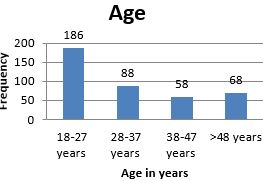Face mask usage during COVID-19 pandemic in rural population of Madhyapradesh: A knowledge, attitude and practice study.
Abstract
Introduction: A face mask is a perfect tool to control the spread of COVID-19 infection. Theknowledge, attitudes and practices toward the use of face masks will be helpful to understandsociety's readiness to accept and follow preventive guidelines from the health authorities. Baselineinformation collected in this study can be used for the implementation of the COVID-19 controlprogramme. Hence, this study was conducted.
Material and methods: This is a cross-sectionalstudy conducted in a rural area of Madhyapradesh. House to house survey was completed to collectthe information on knowledge, attitude and practice regarding face masks.
Result: Out of 400participants, 318 (79.5%) participants know that COVID-19 can be transmitted by respiratorydroplet and 253(63.3%) participants know that COVID-19 can be sent by contact route. Total349(87.3%) participants responded that wearing a face mask can prevent COVID-19 transmission.Maximum participants know about cloth masks, i.e. 367(91.8%) and surgical masks, i.e.277(69.3%).
Conclusions: Maximum participants learn various types of face masks, and they alsoknow that they can prevent COVID-19 disease. Maximum participants had a positive attitudetowards wearing a face mask at crowded places. One crucial finding came out that some participantshad shared their face masks with other people. Maximum participants had motivated their familymembers for wearing a face mask. IEC activities can be conducted by a health worker in a rural areaon proper use, proper disposal and storage of face masks
Downloads
References
https://doi.org/10.23750/abm.v91i1.9397 PMID: 32191675.
2) Javid B, Weekes MP, Matheson NJ. Covid-19: should the public wear face masks? BMJ [Internet].
2020; 369(April):11–2. Available from: https://doi.org/10.1136/bmj.m1442 PMID: 32273278
3) World Health Organization -. Coronavirus Disease (Covid-19) Outbreak: Rights, Roles and Responsibilities
of Health Workers, Including Key Considerations for Occupational Safety. World Health Organization. 2019;(December):1–3.
4) Koven S. Engla, Journal 2010 New England journal. N Engl J Med [Internet]. 2020;1–2. Available from: nejm.org
5) Feng S, Shen C, Xia N, Song W, Fan M, Cowling BJ. Rational use of face masks in the COVID-19 pandemic. Lancet Respir Med [Internet]. 2020; 8(5):434–6. Available from: https://doi.org/10.1016/S2213-
2600(20)30134-X PMID: 32203710
6). Kumar J, Katto MS, Siddiqui AA, Sahito B, Jamil M, Rasheed N, et al. Knowledge, Attitude, and Practices
of Healthcare Workers Regarding the Use of Face Mask to Limit the Spread of the New Coronavirus Disease (COVID-19). Cureus. 2020; 12(4). PLOS ONE Use of face mask: Knowledge, attitude and practice.
7) ECDC. Using face masks in the community. Eur Cent Dis Prev Control. 2020;(April):1–6.
8) Lee LYK, Lam EPW, Chan CK, Chan SY, Chiu MK, Chong WH, et al. Practice and technique of using
face mask amongst adults in the community: A cross-sectional descriptive study. BMC Public Health.
2020; 20(1):1–11. https://doi.org/10.1186/s12889-019-7969-5 PMID: 31898494
9) Azlan AA, Hamzah MR, Sern TJ, Ayub SH, Mohamad E. Public knowledge, attitudes and practices
towards COVID-19: A cross-sectional study in Malaysia. PLoS One [Internet]. 2020; 15(5):1–15. Available
from: https://doi.org/10.1371/journal.pone.0233668 PMID: 32437434
10) Person B, Sy F, Holton K, Govert B, Liang A. Fear and stigma: the epidemic within the SARS outbreak. Emerg Infect Dis. 2004;10:358-63.
11) Tao N. An analysis on reasons of SARS-induced psychological panic among students. J Anhui Inst Educ. 2003;21:78-9.
12) Sayare B, Bhardwaj VK, Fotedar S, Vashisth S, Thakur AS, Rawat SK, et al. Knowledge attitude and practices regarding mask usage during COVID-19 pandemic in general population of India: a qualitative study. Int J Community Med Public Health 2021;8:1857-62.
13) Sikakulya FK, Ssebuufu R, Mambo SB, Pius T, Kabanyoro A, Kamahoro E, et al. (2021) Use of face masks to limit the spread of the COVID-19 among western Ugandans: Knowledge, attitude and practices. PLoS ONE 16(3): e0248706. https:// doi.org/10.1371/journal.pone.0248706
14) Al-Hanawi MK, Angawi K, Alshareef N, Qattan AMN, Helmy HZ, Abudawood Y, Alqurashi M, Kattan WM, Kadasah NA, Chirwa GC and Alsharqi O (2020) Knowledge, Attitude and Practice Toward COVID-19 Among the Public in the Kingdom of Saudi Arabia: A Cross-Sectional Study. Front. Public Health 8:217. doi: 10.3389/fpubh.2020.00217.
15) Agarwal Prachi and Imtiyaz, Bushra and M. S., Raunaq and Jamwal, Chahat, Knowledge, Attitudes, and Practices (KAP) about COVID-19 among Indian Population: A Cross-sectional Study (July 22, 2020). Available at SSRN: https://ssrn.com/abstract=3658195 or http://dx.doi.org/10.2139/ssrn.3658195.
16) Lee, M., Kang, BA. & You, M. Knowledge, attitudes, and practices (KAP) toward COVID-19: a cross-sectional study in South Korea. BMC Public Health 21, 295 (2021). https://doi.org/10.1186/s12889-021-10285.
17) Hager E, Id IAO, Id OB, Zainab A. Knowledge, attitude, and perceptions towards the 2019 Coronavirus Pandemic: A bi-national survey in Africa. 2020;1–13. Available from: http://dx.doi.org/10.1371/journal

Copyright (c) 2022 Author (s). Published by Siddharth Health Research and Social Welfare Society

This work is licensed under a Creative Commons Attribution 4.0 International License.


 OAI - Open Archives Initiative
OAI - Open Archives Initiative


